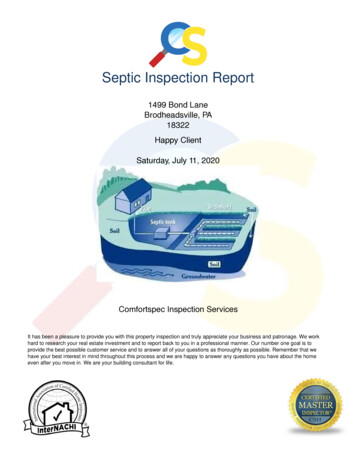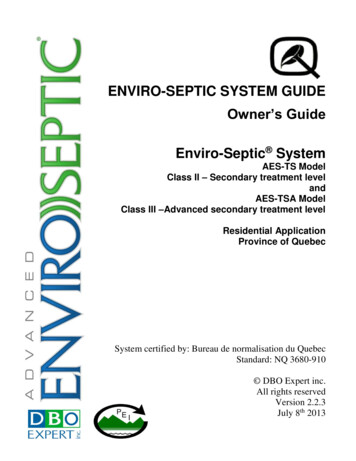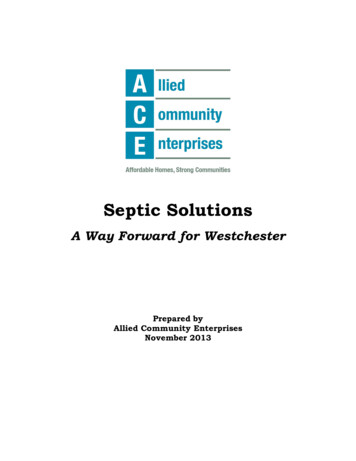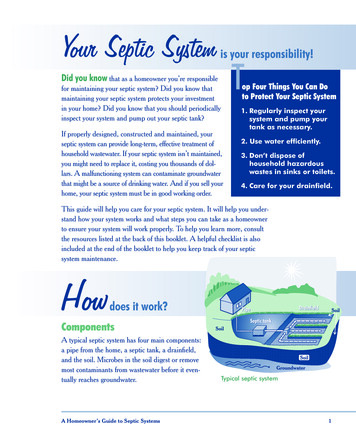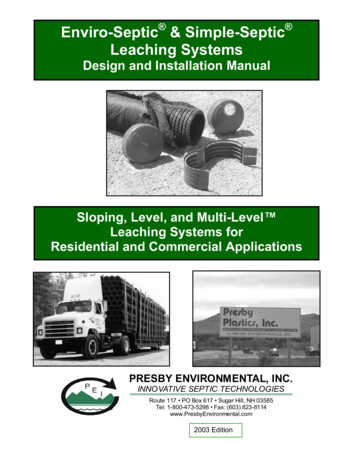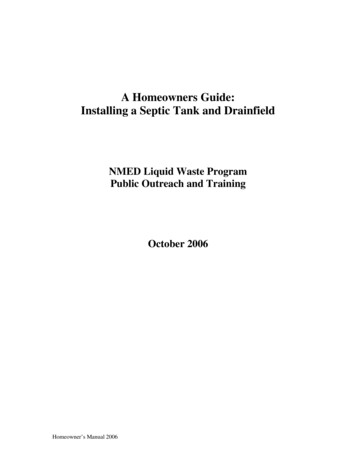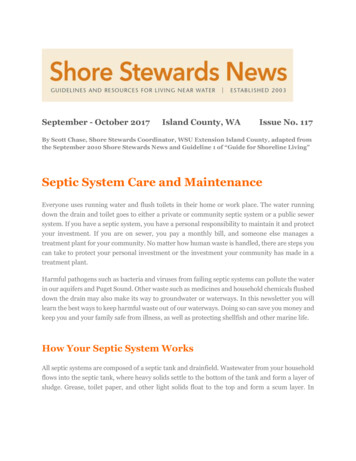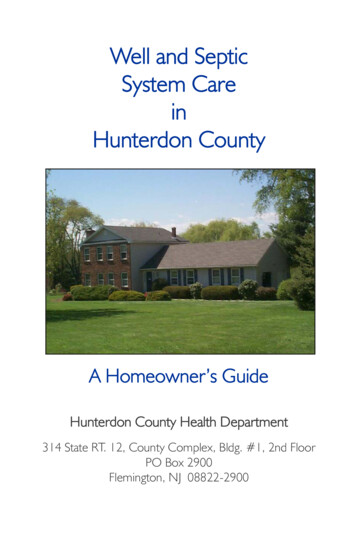
Transcription
Well and SepticSystem CareinHunterdon CountyA Homeowner’s GuideHunterdon County Health Department314 State RT. 12, County Complex, Bldg. #1, 2nd FloorPO Box 2900Flemington, NJ 08822-2900
Revised1/19
Stop and consider how often you use water during a 24-hourperiod. Consider the importance of clean water coming out of yourtap. Could you manage your household if your water systembecame polluted?This booklet is specifically for Hunterdon County homeowners, andit stresses the importance of properly maintaining individual well andseptic systems. This booklet is also designed tohelp homeowners understand how thesesystems operate, and how to keep themoperating smoothly. This information should helpCould you provide long-term protection for one of ourmanage your most precious resources.householdAs you read through this booklet consider this:without aclean, safe Materials put down the drain today may very wellwater supply? come out of the faucet in the future.Despite the proximity of the Delaware River, theSouth Branch of the Raritan River, and NewJersey’s two largest reservoirs, Hunterdonresidents rely primarily on ground water for household watersupplies. More importantly, most residents use private wells as awater source and on-site septic systems for sewage disposal.1
Our most valuable resource .A clean, available water supplyFigure #1New Jersey well codes require that all drilled wells be cased with aminimum of 50 feet of steel pipe and be constructed with a minimum of 20 feet of casing set into bedrock. The casing is installed insections, with each joint carefully sealed. The installation of thewell, as shown in Figure #1, along with final grouting (cementing ofvoid) prevents surface seepage and contamination. HunterdonCounty wells drilled after 1978 must have a wellhead that extends12 inches above ground level to reduce the chances of surfacewater carrying pollutants into the well. Wells that were drilledbefore to 1978 may have the top of the well below the surfaceground. Current codes require that the well be brought above thesurface of the ground when a well is repaired. This retrofitting ofthe well reduces the likelihood of surface water intrusion.Shallow wells and springs are extremely vulnerable to pollution andshould be tested frequently.2
Well WaterHunterdon County has a very complex geology, with a wide varietyof soil types. Most of the aquifers consist of fractured rock formations.There is a great range of well depths throughout the county, rangingfrom a minimum of 50 feet to more than one thousand feet,depending on the geographic area.As Figure #2 indicates, private wells carry a certain vulnerability.Their risk comes from how the land surface is being used – orabused. The closer a well is to a source of groundwatercontamination, the higher the risk of contaminated water. Whilewater companies are required by law to test customers’ waterregularly, owners of private wells are ‘on their own’.Figure #2Water Flow from the AquiferWhen a resident turns on the tap, the well pump is activated andwater is drawn out of the fractured rocks and into the well. As wateris drawn from the aquifer, it will be replaced by normal rainfall orindirectly, from underground movement of water out of nearbystreams and reservoirs. Ground water moves very slowly, only a fewinches per year in many areas. It is easy to see that once itscontaminated, an aquifer is slow to cleanse itself.3
Clean Water Has Its Own ProblemsNaturally occurring elements in the geology of Hunterdon Countycause some variation in the natural chemistry of our drinking water.Most water in the Hunterdon County is quite ‘hard’, which producescalcium deposits. The ‘lime’ deposits (actually calcium carbonate) canbe removed by soaking your kettle, humidifier, etc. overnight withwhite vinegar (rinse it well before re-using).Iron and manganese are naturally occurring elements common inHunterdon County drinking water and are not harmful to our health,but at higher concentrations can cause staining of plumbing fixtures,dishes and laundry.Other natural elements that can be of a health concern in our watersupply include arsenic and sulfur.Naturalelements inyour watercan beremoved withwatertreatmentequipmentsuited to theparticularproblem.Radon gas has also been found dissolved in wellwater in Hunterdon County. Very high levelsmust be present in water to cause elevated airlevels in the home. The primary source of unsaferadon levels is gas seeping into homes throughbasement entry points. Control efforts, therefore,should focus on these areas rather than on wellwater as a source. (For more information aboutradon gas, contact the NJDEP www.njradon.org)4
Water that measures below 6.5 pH is considered excessively acidic, the optimum range is6.5-8.5. Acidic water can cause the corrosionof plumbing. When acid is present andcorrosion occurs, it is easily identified by bluegreen staining where copper plumbing exists.Acid-produced corrosion can also leachdangerous heavy metals, such as lead, fromsoldered joints. Treatment devices are available.Water measuringbelow 6.5 on thepH scale shouldbe treated withneutralizingequipment toprevent corrosionof pipes andleaching of leadfrom solderedjoints.The Hunterdon County Department ofHealth and New Jersey’s Department of Environmental Protection recommends that residents using private wells have them testedonce a year to ensure the well is free fromharmful bacteria. Additional testing of nitrate,arsenic and volatile organic compounds arerecommended every five years. The NewJersey Private Well Testing Act (PWTA) affectsthe resale of properties served by wells andalso rental properties served by wells. See ourwebsite for a link to NJDEP’s frequently asked questions relating tothe PWTA.5
Treatment systems should be installed and maintained by aprofessional. The table below will give you a general idea of the typesof treatment systems needed.TREATMENTEFFECTIVE FOR:Activated Carbon FiltrationSome organic compounds, taste, trihalomethanes,some pesticides, odorAir StrippingSome volatile organics compounds, hydrogensulfide, radon gasChlorinationColiform BacteriaIon exchangeHard water, calcium, manganese, iron, someheavy metals, nitrate and gross alphaReverse OsmosisNitrates, dissolved solids, certain inorganiccompoundsUltraviolet RadiationColiform BacteriaDistillationInorganic compounds (such as nitrates, sodiumchloride), some organic compoundsGranular Adsorption MediaSome inorganic compounds (such as arsenic)Basic water analysis for new homes includes all theparameters under the NJ Private Well Testing Act6
The Private Septic SystemThe majority of Hunterdon County homeowners rely exclusively onprivate septic systems to properly treat and dispose of domesticwaste.How Does A Septic System Work?Properlydesigned,installed andmaintainedseptic systemshave littleadverse effecton theenvironmentAs shown in Figure 3, a septic system has two keycomponents:A container usuallyThe Septic Tank:prefabricated from concrete. It receives wastewater from your bathroom, kitchen and laundryroom. Heavy particles settle at the bottom assludge and light materials float to the surface ofthe tank forming a scum layer. Bacteria in thesystem help to break down and liquefy theorganic matter, which is carried to the disposalfield as effluent.A septic tank should be sized to allow enoughtime for settling of heavy particles and flotation ofscum. The partially treated effluent then flows from the septic tank tothe sub-surface disposal area.The Disposal Field: This consists of a distribution box and perforateddistribution lines (laterals) installed below the ground in gravel beds ortrenches where further treatment filtering action takes place. Seepage pits can also be used in some places.Septic systems must be designed and installed to meet standardsestablished by state law, and in some instances, local ordinances.7
8Septic systems must be designed and installed to meet standards established bystate law, and in some instances, local ordinances.
Septic System DesignSeptic Systems are designed and installed according to NJDEPregulations and, in some instances, local ordinances. Theseregulations require testing of the soil to determine its permeability.Various tests can be conducted, including tube permeameter,percolation test, basin flooding, pit-bailing or soil permeability classrating.When designing a system, an engineer determines the level of thewater table to ensure that it is at the required distance below thebottom of the disposal area. The size of the disposal area and theseptic tank is based on the number of bedrooms in the home.Figure #4Caution: Gases generated within the septic tank can accumulate totoxic concentrations which have been fatal to humans. No oneshould ever enter a septic tank or even just peer into the tankthrough a manhole cover without exercising extreme caution.9
Preventing Septic System ProblemsFrom Inside Your Home1 Cut back on household usage – fix leakyREMEMBER: faucets and toilets, and don’t flush the toiletunnecessarily. Install low-flow fixtures for showerProper care heads, toilets, etc.and2 Limit the amount of cleaning agents that you use.maintenance They can be harmful to a septic system if used inof your septic excess.3 Space your showers, laundry and dishwashersystem helps loads, allowing your system to ‘rest’ betweenensure itshigh-volume uses.4 Never allow toxic and hazardous chemicals to beproperfunctioning disposed of through your septic system. Thisand longevity includes paint thinner, surplus paint, oil, gasoline orgrease. These items should be saved and disposedof at the Hazardous Waste Days sponsored by theHunterdon County Division of Solid Waste and Recycling (see lastpage).5 Limit paper products to the absolute minimum. Do not put coffeegrounds, disposable diapers, sanitary napkins, tampons, cat litter,baby wipes and cigarette butts into your septic system.6 Use of garbage disposals is not permitted unless your system wasdesigned for a garbage disposal.7 Avoid using septic system cleaner additives.They are notnecessary, and some can interfere with the natural bacterialaction of your system.8 Have your septic system pumped every three years to clean out theaccumulated sludge. Pumping extends the life and efficiency of yoursystem.9 Water softeners must not drain into the septic system withoutapproval by a professional engineer.10 If an ejector pump is used in a home to remove sewage, such as for abasement toilet, both the septic tank and disposal field must be 50%larger than would normally be needed.11 Prior to any septic system modifications (including repairs,alterations or new installations), a permit is required by theHunterdon County Department of Health. (See website for application)10
Preventing Septic System ProblemsFrom Outside Your Home1234567Know exactly where your septic system is located – before you havetrouble. If you can’t locate it, ask a neighbor, the previous owner oryour builder to help you find it. You can also check the records atthe Hunterdon County Department of Health.There should be no visible effluent, septicodor, or backup into the house. These warningREMEMBER:signs indicate a problem may exist.Direct roof drains and sump pump Be sure to havedischarges away from your disposal field. the your septicSeptic systems do not work well if youtank pumpedoverload the drainage field.out by aDo not physically abuse your septic tank orlicenseddisposal field by parking vehicles or placingpumper atpermanent structures (such as above groundpools, decks, or driveways) over the area.least everyCheck with the Hunterdon Countythree yearsDepartment of Health for proper setbackdistances.Keep trees/shrubs from growing on or closeto the disposal area. This will prevent roots from clogging thedistribution laterals.Effluent filters in your septic tank need to be cleaned according tomanufacturer specifications.Systems with advanced technologies require ongoing maintenancecontracts for the life of the system.11
Useful Community ResourcesYour tax dollars are at work providing you with many resources forassistance with well and septic problems.Hunterdon County Department of Health908-788-1351314 State Rt. 12, County Complex, Bldg #1, 2nd FloorPO Box 2900Flemington, NJ 08822-2900E-Mail: health@co.hunterdon.nj.usVisit the county website at www.co.hunterdon.nj.us/health.htmHunterdon County Division ofSolid Waste and RecyclingPO Box 2900Flemington NJ html908-788-1351NJ Department of Environmental Protection Hotline 877-926-6337Raritan HeadquartersA non-profit environmental organizationwhich sponsors well-testing programs forprivate homeowners.908-234-1852Hunterdon County Soil Conservation DistrictProvides information on county soil types, erosioncontrol, storm water management908-788-9466Hunterdon County Extension ServiceProvides useful information for home, yardand farm 88-1338Waste Oil DisposalGas and service stations displaying the recycling logo are required toaccept waste oil.12
“Hazardous Waste Clean-Up Day”Waste such as those listed below should never be disposedof in a septic system, but rather safely set aside and broughtto the next Hunterdon County Hazardous WasteClean-Up Day.* Latex Paint* Varnish/Stains* Herbicides* Gas/Oil Mix* Mercury* Oil Based Paint* Battery Acid* Gasoline* Drain Cleaner* Anti-freeze* Insecticides* Pool Chemicals* Photographic Chemicals* Fuel Oil/Sludge* Paint Thinner* Pesticides* Diesel Fuel* Kerosene* Used Motor OilWatch the local papers and the Hunterdon CountyWebsite for the next date, or call Hunterdon CountyDivision of Solid Waste and Recycling at 908-788-1351.Our most valuable resource .A clean, available water supply
Hunterdon County Health Department314 State Rt. 12, County Complex, Bldg #1, 2nd FloorPO Box 2900Flemington, NJ 08822-2900
dangerous heavy metals, such as lead, from soldered joints. Treatment devices are available. The Hunterdon County Department of Health and New Jersey's Department of Envi-ronmental Protection recommends that resi-dents using private wells have them tested once a year to ensure the well is free from harmful bacteria. Additional testing of nitrate,

